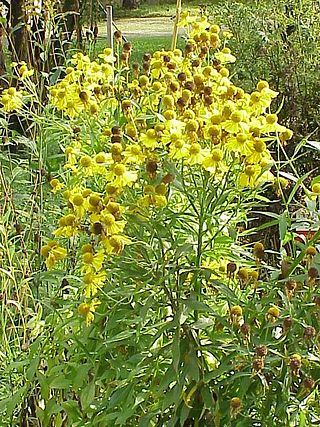
Helenium autumnale is a North American species of poisonous flowering plants in the family Asteraceae. Common names include common sneezeweed and large-flowered sneezeweed.
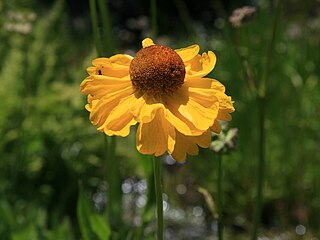
Helenium bigelovii is a North American perennial plant in the sunflower family, commonly known as Bigelow's sneezeweed. It grows in moist areas such as meadows, marshes, or streamsides. It is found at moderate and higher elevations (3000–10,000 ft) in the foothills and mountains of California and Oregon: Cascades, Coast Ranges, Klamath Mountains, Sierra Nevada, etc. Cultivars of the species are used in gardening as ornamentals.
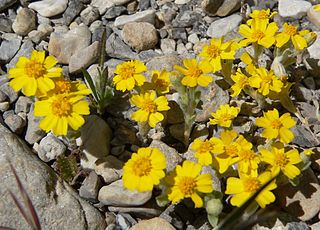
Eriophyllum wallacei is a North American flowering plant in the family Asteraceae known by the common names woolly daisy and woolly easterbonnets. It grows in the southwestern United States and northwestern Mexico. It may grow in clumps or on short erect stems in sand, rocks, and gravel.

Baileya multiradiata is a North American species of sun-loving wildflowers native to the deserts of northern Mexico and the Southwestern United States. It has been found in the States of Sonora, Chihuahua, Coahuila, Durango, Aguascalientes, California, Arizona, Nevada, Utah, New Mexico, and Texas.
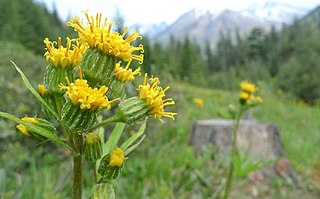
Cacaliopsis is a monotypic genus of flowering plants in the aster family, Asteraceae, containing the single species Cacaliopsis nardosmia. It is known by the common name silvercrown. It is native to western North America.

Chaenactis fremontii, with the common names Frémont's pincushion and desert pincushion, is a species of annual wildflower in the daisy family. Both the latter common name, and the specific epithet are chosen in honor of John C. Frémont.

Cirsium neomexicanum is a North American species of thistle known by the common names New Mexico thistle, powderpuff thistle, lavender thistle, foss thistle and desert thistle.
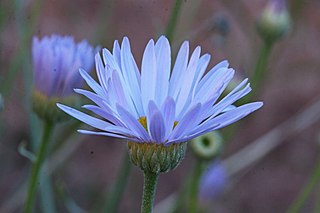
Erigeron utahensis is a North American species of flowering plant in the family Asteraceae known by the common name Utah fleabane.

Helenium amarum is a species of annual herb in the daisy family known by the common names yellowdicks, yellow sneezeweed, fiveleaf sneezeweed, and bitter sneezeweed. It is native to much of the south-central United States and northern Mexico, and it is present elsewhere in North America, Australia, and the West Indies as an introduced species.

Helenium bolanderi is a North American species of flowering plant in the family Asteraceae known by the common name coastal sneezeweed. It is native to southern Oregon and northern California as far south as Mendocino County, primarily along the seacoast.

Hulsea algida is a species of flowering plant in the daisy family, known by the common name Pacific hulsea or alpine gold. It is native to the western United States.
Hymenoxys cooperi is a species of flowering plant in the daisy family known by the common name Cooper's rubberweed. It is native to the southwestern United States and Great Basin, where it grows in rocky soils in arid regions from southern California to New Mexico, north as far as Idaho and Oregon.

Hymenoxys lemmonii is a species of flowering plant in the daisy family known by the common names Lemmon's rubberweed, Lemmon's bitterweed, and alkali hymenoxys. It is native to the western United States in and around the Great Basin in Utah, Nevada, northern California, and southeastern Oregon.

Agoseris aurantiaca is a species of plant in the family Asteraceae, commonly called orange agoseris or mountain dandelion. It is widespread in western North America.

Agoseris glauca is a species of flowering plant in the family Asteraceae known by the common names false dandelion, pale agoseris, prairie agoseris, and short-beaked agoseris. It is native to western North America.

Balsamorhiza sagittata is a North American species of flowering plant in the tribe Heliantheae of the family Asteraceae known by the common name arrowleaf balsamroot. Also sometimes called Oregon sunflower, it is widespread across western Canada and much of the western United States.

Crepis modocensis is a species of flowering plant in the family Asteraceae known by the common name Modoc hawksbeard.

Enceliopsis nudicaulis is a North American species of flowering plants in the family Asteraceae known by the common name nakedstem sunray, or naked-stemmed daisy.

Tetraneuris acaulis is a North American species of flowering plants in the sunflower family. It is known by many common names in English including stemless four-nerve daisy, stemless hymenoxys, butte marigold, and stemless rubberweed.
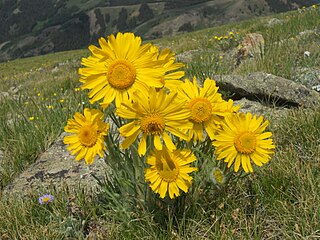
Hymenoxys grandiflora is a North American species of flowering plant in the daisy family known by the common names graylocks four-nerve daisy, graylocks rubberweed, or old man of the mountain. It is native to high elevations in the Rocky Mountains of the western United States.




















